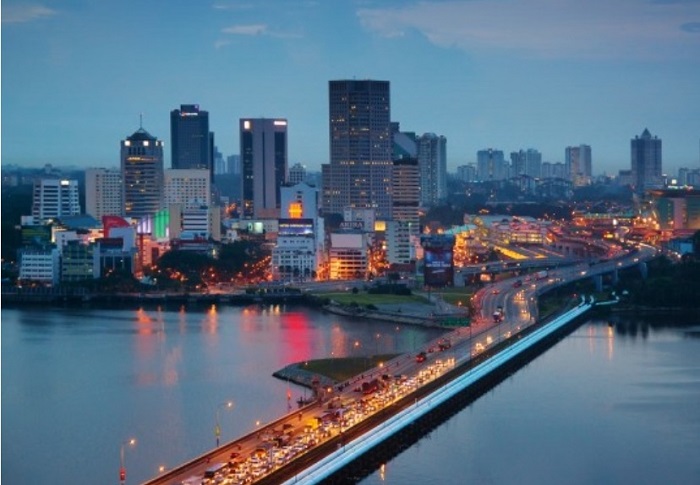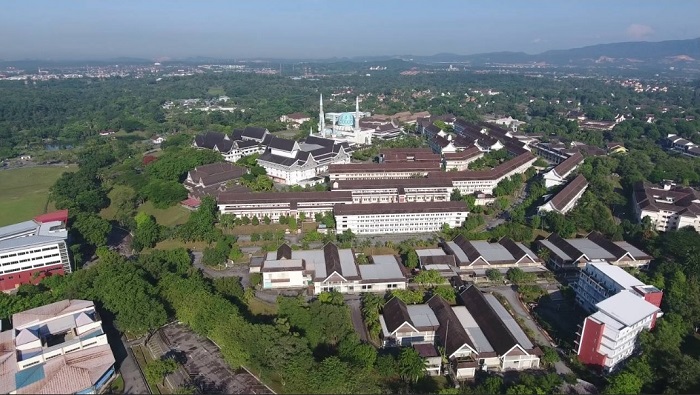- Launch of Digital Johor Masterplan 2030 delayed till 1Q24
- Can incoming Sultan, Tengku Ismail, inject urgency and drive state govt needs

Having run the Malaysian operations of European integrated device manufacturer, STMicroelectronics in Johor for the last 10 years, and growing headcount from under 2,000 to just under 5,000 people, Tan Chun Shang (pic, below), group vice president and general manager of STMicroelectronics Sdn Bhd located in Muar, has a good feel for the economic pulse of Johor.
From a manufacturing aspect, he believes Johor is already an industrialised state with infrastructure that is very advanced and on par with the infrastructure in advanced states in Malaysia and with Singapore.
 “Our infrastructure is probably as good and on par with what Singapore has,” Tan said, qualifying his statement by adding, “especially if you look at Johor Baru and the various industrialised zones.”
“Our infrastructure is probably as good and on par with what Singapore has,” Tan said, qualifying his statement by adding, “especially if you look at Johor Baru and the various industrialised zones.”
Johor has successfully married this strength of infrastructure with manufacturing talent he said. “There is no shortage of manufacturing talent in Johor and proof of this can be seen from the many multinationals in the state.”
To be sure this was no overnight success and has been the result of three decades of policy and strategy by the state, and partnering with the Federal Government, to turn it into an industrial hub and vibrant economy to rival Penang and the Klang Valley, the established economic engines of Malaysia.
“Obviously more can be done to further elevate the economic growth of Johor,” said Tan who agreed that raising the digital savviness of the workforce is crucial for this next stage in order for Johor to become a robust digital powered economy. “It is all about the talent.”
Gears are already in motion, but need a push
As Digital News Asia had previously reported last month, the timing of Johor rebooting its digital economy ambitions with the launch of Digital Johor Masterplan 2030 (DJM2030) after lacklustre results from an earlier effort since 2017, coincides with a young and digital savvy Tunku Mahkota Johor (Johor Crown Prince) Tengku Ismail, stepping in as Sultan of the state for five years from Jan while his father Sultan Ibrahim Almarhum Sultan Iskandar is appointed the Agung (King) of Malaysia for a five year term.
The prospect raises intriguing possibilities according to some Johoreans.
Acknowledged to be ambitious, aggressive and impatient to drive results, some entrepreneurs and policy makers from Johor say they expect Tengku Ismail (pic), who goes by the moniker TMJ, to exert the formidable soft power the state royalty command, to push for results.
power the state royalty command, to push for results.
To be clear, the royalty has no official role in the running of the state’s administrative affairs. But the palace does get updated by the state leadership on key matters.
And here, a royal push is already needed.
Arising from numerous engagements with various stakeholders over the past 6 months with the goal of formalizing an action plan, the DJM2030 was supposed to have been launched this month. That is not happening.
According to a state technocrat the launch has been pushed to Q1 2024 as there is a need to align it with various existing state Blueprints including the Johor smart city blueprint and the Johor Baru City Council smart blueprint that is currently in the final stages of planning with another meeting this past week.
An elusive blueprint, the Johor 2030 Smart City Blueprint was first announced by Johor Chief Minister Onn Hafiz Ghazi in May 2022 who urged prayer by all to ensure the plans were implemented well. Not further news came out until it reappeared in June 2023 with no explanation by Onn Hafiz over the delay and portrayed as if it was the first announcement of the blueprint.
To some “aligning with existing blueprints” sounds like a convenient excuse and an exercised in death by power-point. It will be interesting to see if TMJ throws his support behind the JDM2030 when he becomes the Sultan, and demands to see it speedily executed to benefit the state’s residents and businesses.
The concern is that other announced plans by the State have gone nowhere as well. In Jan 2022 a drone test site in Medini, Johor, purported to be the largest in Southeast Asia was launched in line with the Iskandar Next initiative, a public-private partnership in support of the state’s digital economy agenda.
In a press release then, Iskandar Investment Bhd said DRZ Iskandar will bring in RM351 million investments and generate 1,000 high- value jobs by 2025 in drone and robotics.
No updates have been forthcoming since the launch. Two leading drone players in Malaysia have no operations there. A CEO familiar with the plans said they were only interested in renting facilities without offering meaningful value. The CEO of a robotics company DNA reached out to did not take up space there.
The lesson here is the need for accountability and course change when the market is not receptive to initiatives launched. Will TMJ take an interest here and demand this from state leadership?
Driven by the Johor State Economic Planning Division or BPEN by its Malay language acronym, the DJM2030 has numerous initiatives (see table) that are supposed to have started this year including developing a single window for citizens to access state government services; set up startup seed and launchpad programs in collaboration with Federal agencies; establish a 42 Johor campus is collaboration with Malaysian Digital Economy Corp (MDEC) as how Penang has done so; deploy volunteers to teach basic digital skills to rural and urban communities in the state; establish a state industry-led skills development centre and many others.
With the delay, the timeline for the many plans will need to be adjusted now.

The boon and bane of proximity to Singapore
The successful execution of DJM2030, resulting in an advanced digital economy with a digitally-savvy talent pool, is magnified by the opportunity for Johor to meet Singapore’s digital talent demand instead of the current blue-collar talent pool it provides.
To be sure, tech based jobs pay above average to very well in Malaysia even, as Pikom’s annual Digital Jobs Market Outlook 2022 makes clear. The strength of the Singapore currency against the Ringgit however makes it a no brainer for many Malaysians with Johor based bosses frequently bemoaning the loss of talented workers to Singapore.
Before the pandemic Singapore media have reported that around 300,000 workers from Johor cross the causeway daily to work in mostly blue-collar roles on the island.
Manoj Menon, founder of research startup Twimbit and former Kuala Lumpur-based global partner at consulting firm Frost & Sullivan coins this move to meet Singapore’s digital skills shortage a Singapore Plus Plus partnership. Observing that many Singapore based companies are constrained by growth due to lack of sufficient digital talent, Johor hits a sweet spot if it can meet this need.
Tan of STMicro agrees. “And they don’t need to travel to Singapore to work,” he said of digital savvy Johor based talent. “That is the nature of much of today’s digital work,” he adds.
No lack of education options

One feature of digital roles is that they do not require university degrees. And in this aspect, Johor has a wide range of technical and vocational and training institutes (TVET) that dot major cites in the state, ensuring that residents do not only have post-secondary education options in the state capital of Johor Baru.
In Malaysia, TVET based education is heavily subsidized by the government with some government agencies running specialized programs for Bumiputera as well, such as MARA (Majlis Amanah Rakyat), which has six skills development centres in the state to augment the various TVET options.
The challenge is for the quality of the many courses offered by the institutions to meet market needs. There is no data publicly available that shows the employability ratio of graduates from the TVETs. However, one of the plans outlined in the DJM2030 is for the state to have a data driven job-to-skills matching portal that will shed light on the quality of the various TVETS and with a chance to correct weaknesses.
As far as university education goes, the push for the city of Iskandar to be an EduCity since 2010 with four international universities/colleges and two local institutions of higher education established so far, has added to the many higher education facilities located in the state which also include three public universities – University Technology Malaysia, University Putra Malaysia and University Tun Hussein Onn.
The universities provide a ready pool for employers to partner as well with STMicro having IoT Labs in two universities, one in Johor and one in the neighbouring state of Melaka. “We are very happy with the quality of work that comes out of the two labs,” said Tan.
Indeed, Manoj sees this as a winning strategy for the state to brand itself as a great place for young talent to come to university /college / TVET to learn and play.
“The state has to drive public private partnership and create research programs, internship programs and national research institutions to develop this in Johor. Imagine if research hubs into AI, Data analytics, Cybersecurity, Metaverse, Autonomous Vehicles etc are thriving here, and they offer opportunities for students to do good work and learn. Then they will be able to overcome any talent shortages and companies across the border here in Singapore will definitely take notice.”
With TMJ’s father, the incoming Agung of Malaysian already serving notice and making waves in media interviews that he intends to play an active role in ensuring Malaysia is led capably and responsibly by its elected leaders, there will be great interest on Johor to see how the young TMJ will play the role of Sultan. One thing for sure, he will push for action and results, and, he will not be relying on prayer for success.
Next: Can Johor’s digital ambitions support the audacious dream of academic turned entrepreneur Dr Yeong Che Fai of DF Automation?

